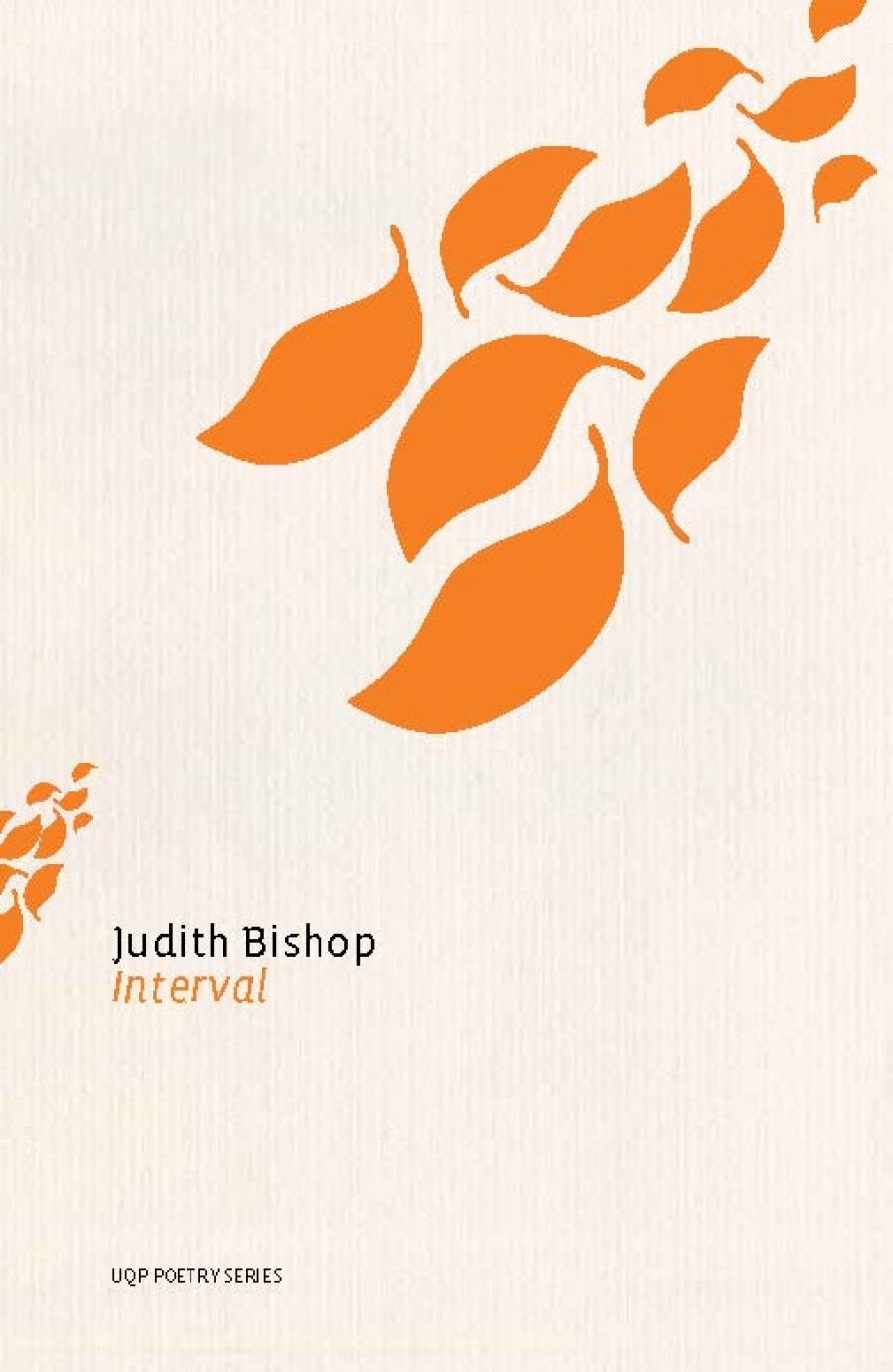
- Free Article: No
- Contents Category: Poetry
- Custom Article Title: Jill Jones reviews 'Interval' by Judith Bishop
- Review Article: Yes
- Online Only: No
- Custom Highlight Text:
Judith Bishop’s Interval appears just over a decade since the publication of her first book, also using a one-word title, Event (Salt, 2007). This gap seems far too long. Certainly, there have been two chapbooks in the intervening years – Alice Missing in Wonderland and Other Poems (2008), in the Wagtail series ...
- Book 1 Title: Interval
- Book 1 Biblio: University of Queensland Press, $24.95 pb, 86 pp, 9780702260070
I was one of Event ’s many admirers, for its rich and highly accomplished imagery and, perhaps even more, for its fluid and beguiling syntax. Without venturing too far into a comparison of the two books, it’s worth briefly noting the differences between these two collections. Event was notable for its luxuriant and dense imagistic texture and rich figurative gestures. In comparison, but only in comparison, Interval feels more austere, pared back, and also more personal. Also, the poems are mostly shorter and more tightly formed. Nonetheless, both books exhibit similarities as well, particularly a sense of the elemental.
Overall, there is feeling of tenderness in this new book, a sense of care for this world, especially for family and children but also for language, of how words are associative, either sonically or as working through meanings, though not set meanings (this is poetry after all). There is nothing sentimental in any of this. Rather, it seems an ethical impulse, a commitment to the things of this world, and their inter-relations, as the world processes to human-wrought environmental disaster, a world that gives ‘rise to maps; / these ghostly, weeping maps / showing coastlines new and late’ (‘Rising Tides’). It is this unstable and failing world that Bishop’s book and its intimacies inhabit.
Interval ’s first and last poems gesture to this movement between tenderness and intimacy and loss and uncertainty. The first poem, ‘Aubade’, announces Bishop’s intentions towards relationship – ‘Love, the shape-shifter / is on the move’ – just as the book’s final words, in a poem whose title affirms the conditional ‘As If’, end in the infinitive and the incomplete, the fragmentary but also the ongoing and connected, via grammar, sound and sense: ‘to try toward, to ward, to world – / to word this muteness, so’.

There is a sense of disquiet to be found in reading and rereading this book. Where is the place of these poems as many, not all, are hard to place? Why references to Greek myth if the poems are, at least in part, of this continent? The ‘big’ words are all there: love, beauty, infinity, sorrows, heart, etc. This disquiet most likely means the book is doing its subtle work. It is looking ‘towards’ ways of saying muteness. While conceptual, confessional, protest, or imagistic poetries do other work, Bishop’s is more a poetry of enquiry, often philosophical in tone, though very much grounded in visceral life and the familial day-to-day as it works between image and discourse, potential and fate.
But to return to the beginning, it is not only love but also language that is on the move, and it is Bishop’s use of language that centres the book’s enquiry. The second poem, ‘Letter to My Daughters’, contains the line ‘bring me back to change the script’ repeated twice, sometimes as a variant, in the first four stanzas and as the variation ‘But we cannot find the script’ in the last stanza. As well as repetition, Bishop uses a lot of slant rhyme or identical rhyme, and some full rhyme, to create fluid yet resonant and emotional effects. It lends, even to those poems that are in free verse lines, a sense of formal pleasures.
The elemental, as I indicated above, is central to the book, as is the non-human. But as well as being central, these elements and entities are also things that are disturbed, faltering:
I seem to hear
iron girders taking air
risk shaking out its feathers
life falling into elements again
(‘Oceanic’)
A line from Event seems to resonate in regard to this book as well: ‘All my deft surrogates for speech’ (‘The Shatter Rooms’). Across Bishop’s work, and certainly in this new book, there is a sense of attempting to use language to bridge a gap, to find some other place to dwell, more intimate perhaps, or more whole. There is desire – certainly there is a sense of the animal, the scent of sex, of bodies in the book – but this is conditional:
There should be a right distance
at which we should meet
if we could
(‘Interval’)
Even though it is not possible to bridge the gap, not in language, Bishop knows poetry is the thing that must try to do so, again and again.


Comments powered by CComment